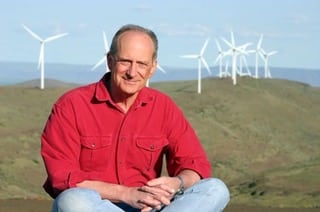Climate Action
Guardians of the Earth: Six Leaders Lighting the Way Forward
April 28, 2025
In a time when environmental threats — from accelerating deforestation and species extinction to climate change, toxic pollution, and environmental injustice — loom larger than ever, a group of tireless changemakers is meeting the moment.
They are also redefining how we understand environmental stewardship in the 21st century.
Denis Hayes: Sustainable Cities Pioneer

Denis Hayes, the coordinator of the first Earth Day in 1970 and a lifelong environmental advocate, has continued to shape green infrastructure and urban sustainability. As the president of the Bullitt Foundation, Hayes has spent the last decade supporting environmental projects in the Pacific Northwest and promoting sustainable building practices.
The Bullitt Center in Seattle, often described as the greenest commercial building in the world, stands as a legacy of Hayes’ vision for regenerative design and carbon-neutral cities. Even as the foundation wraps up its grantmaking, Hayes remains a towering figure in the climate movement, bridging activism, innovation, and architecture.
In addition to his foundational role in organizing the first Earth Day, Denis Hayes has remained deeply involved with the movement through his founding of EARTHDAY.ORG. As board chair emeritus, he has helped guide the organization’s efforts to adapt Earth Day for a digital age, broaden its reach globally, and amplify climate education. Under his influence, EARTHDAY.ORG has expanded its campaigns to include environmental literacy, reforestation, plastic pollution, and voter engagement. Hayes’ continued advocacy ensures that Earth Day remains not just a symbolic event, but a catalyst for year-round action and impact.
Alok Shukla: Guardian of India’s Forests
In April 2024, Alok Shukla received the Goldman Environmental Prize, often referred to as the “Green Nobel”, for leading a grassroots campaign that helped halt 21 proposed coal mines in India’s Hasdeo Aranya forest.
As a core member of the Chhattisgarh Bachao Andolan, an alliance of people’s movements and individuals in Chhattisgarh, Shukla mobilized local Adivasi (tribal) communities to protest environmentally destructive mining projects.
The forests of Hasdeo Aranya, spanning 445,000 acres, are rich in biodiversity and serve as the “lungs of Chhattisgarh.” Thanks to Shukla’s relentless organizing and advocacy, the Indian government halted key coal mining projects in 2022. His victory is a resounding example of grassroots environmentalism succeeding against powerful industrial interests.
Gabriel Paun: Shielding Romania’s Ancient Woodlands
In 2024, Romanian activist Gabriel Paun was honored as a UNEP Champion of the Earth for his work defending Europe’s largest remaining old-growth forests. As the founder of Agent Green, he led investigations and legal battles that exposed illegal logging in Romania’s Carpathian Mountains, many of which are UNESCO protected sites.
Despite facing threats and even physical attacks, Paun has documented and published environmental crimes that threaten irreplaceable forest ecosystems. His courageous work has resulted in stricter enforcement of forestry regulations and increased international scrutiny. His campaign proves that advocacy and transparency can stop ecological devastation, even in remote corners of Europe.
Madhav Gadgil: Lifetime of Ecological Wisdom
Indian ecologist Madhav Gadgil received the United Nations Environment Programme’s 2024 Lifetime Achievement Award. Known for blending rigorous ecological science with traditional knowledge, Gadgil’s research and public service have redefined environmental policy in India. He was the architect of the landmark Western Ghats Ecology Expert Panel report where he played key roles in developing the Biological Diversity Act and the Forest Rights Act.
Gadgil’s commitment to participatory environmental governance emphasizes the importance of giving local communities a voice in protecting their ecosystems. He remains a leading voice for biodiversity conservation and continues to inspire young scientists and activists alike.
Alejandra Warren: Fighting Plastic Pollution at the Source
Alejandra Warren, co-founder and executive director of the nonprofit Plastic Free Future, has been at the forefront of the fight against plastic pollution in California and beyond. Her organization supports local governments in drafting and implementing ordinances to reduce single-use plastics and transition to sustainable alternatives.
Warren was named Activist of the Year by The Reusies in 2022 and has continued to lead education and advocacy efforts that center environmental justice. Her recent focus is on empowering frontline communities most affected by plastic production and waste, and emphasizing equitable solutions to global pollution problems.
Christina Lee Brown: Philanthropy for Planetary Health
Christina Lee Brown, a philanthropist based in Louisville, has channeled her resources into tackling the intersection of environmental conditions and public health. Through her support of the Christina Lee Brown Environment Institute at the University of Louisville, she has helped fund cutting-edge research on the links between cardiovascular health and environmental exposures.
In 2024, the institute secured more than $11 million in new grants from the National Institutes of Health and the Department of Defense—thanks in large part to Brown’s foundational investments. Her work highlights the critical role philanthropy can play in transforming scientific knowledge into healthier communities.
A Global Network of Green Champions
From India’s forested heartlands to Eastern Europe’s ancient woodlands, from the streets of California to the green rooftops of Seattle, these six environmental heroes embody the global breadth and diversity of today’s environmental movement. Whether working in grassroots advocacy, policy reform, sustainable development, or research funding, each of them reminds us that meaningful change is possible—when passion meets purpose.
As the world continues to grapple with a myriad of ‘green’ issues, their stories shine as beacons of hope and blueprints for action.